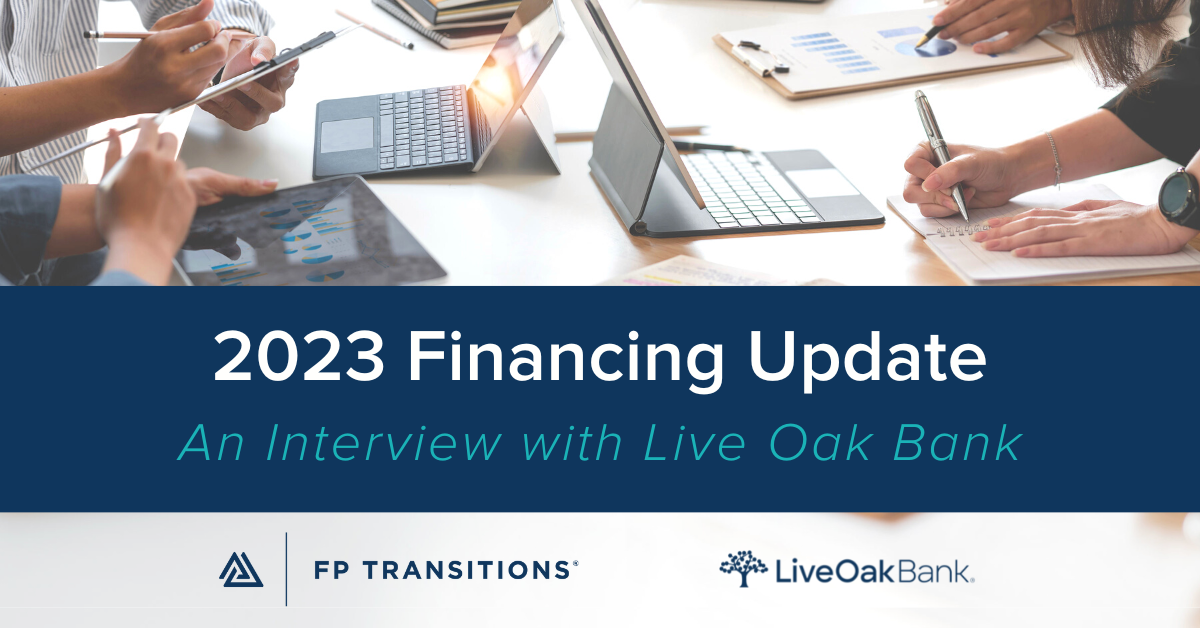/Blog%20Banner%20-%20The%20Dangers%20of%20Napkin%20Negotiations.png?width=1200&height=628&name=Blog%20Banner%20-%20The%20Dangers%20of%20Napkin%20Negotiations.png)
ARE YOU CONSIDERING THESE IMPORTANT STAKEHOLDERS IN YOUR TRANSACTION?
Finding the right transaction partner, and executing a potentially complicated and emotional transition, can attract most of the consideration in an M&A deal. It’s important to also look beyond the immediate stakeholders–you, your ownership team, and your transition partners–to a few other groups who will be greatly impacted by the change: your family, your team, and your clients.
Read More
Topics:
Selling Your Practice,
Acquisition,
M&A,
Deal Structure,
Buying & Selling,
Client Experience

One could argue that the open market acquisition process is a bit like online dating. Using a finite amount of fields and characters you must convey to someone–whom you’ve never met and know a limited amount of information about–that you are worth their time. That you are worth their time conversing with, spending time together, and potentially making a binding commitment with.
And like dating, finding the right match isn’t about how much someone is willing to spend on dinner, but how many of your attributes complement each other, how well you get along, and how much you trust each other. These matters are paramount to making a relationship work–whether it’s friendship, love, or business acquisition.
Read More
Topics:
Selling Your Practice,
Acquisition,
M&A,
Deal Structure,
Buying & Selling
/Blog%20Banner%20-%20The%20Dangers%20of%20Napkin%20Negotiations.png?width=1200&height=628&name=Blog%20Banner%20-%20The%20Dangers%20of%20Napkin%20Negotiations.png)
The financial services industry is a personable one. Professional networking and client prospecting depend on your charisma and ability to connect beyond surface pleasantries. But when it comes to selling your business, it’s important to keep your cards close to your chest.
It’s very easy to get excited about the prospect of transitioning your business and moving forward in life–especially, when you’re talking with a colleague you’ve known for years. However, the excitement can cloud your ability to think through details and maintain a healthy level of confidentiality. It’s important to avoid casual negotiations and hashing out deals without proper documentation.
These casual conversations–also referred to as handshake agreements, or napkin negotiations–can lead to a lot of problems, including a loss of realized value.
SHARKS IN THE WATER
The first issue that could arise from the casual mention that you’re even thinking about selling your business is the influx of phone calls or visits from people who want to buy. It’s like blood in the water. And while buyers flocking to you may seem like a boon, it can quickly become overwhelming. Without an efficient screening system, it becomes time consuming and difficult to sift through the phone calls to find serious and qualified candidates, let alone the person who fits your ideal criteria to take over your business. You also make yourself vulnerable to predatory buyers.
Read More
Topics:
Selling Your Practice,
Acquisition,
M&A,
Deal Structure,
Buying & Selling
/Blog%20Banner%20-%20INDEPENDENT%20ADVISORS%20WILL%20UNLOCK%20THE%20FUTURE%20(1).png?width=1200&height=628&name=Blog%20Banner%20-%20INDEPENDENT%20ADVISORS%20WILL%20UNLOCK%20THE%20FUTURE%20(1).png)
Even though it had been in the works for years, last month’s Schwab/Ameritrade merger left both organizations’ advisors wondering what it meant for them. The good news is that the transition has been seen as largely successful, with only some tech snafus which, let’s be honest, is to be expected when you’re talking about huge platform changes for millions of accounts. Adapting to change rarely happens overnight.
Read More
Topics:
Selling Your Practice,
Acquisition,
M&A,
Deal Structure,
Buying & Selling

The decision to sell a financial services practice is a difficult one for any advisor to make. After a lifetime of work to build your business, and after years of earning your clients’ trust, how do you turn the job over to someone else? Will they work as hard as you have? Will they care as much as you do? Will they always put your clients’ interests first? When selling your practice, you get just one chance to do it right. The following case study provides some unique insights into the process and illustrates the opportunities, and the mistakes, that many first time sellers make:
Read More
Topics:
Selling Your Practice,
Acquisition,
M&A,
Deal Structure,
Buying & Selling
Price is usually the most difficult hurdle for buyers and sellers to overcome. The value of a business is different for each party participating in a transaction and is based on opinion and the specific set of circumstances for each individual. Price, on the other hand, is the number at which the transaction is executed. Yes, value informs price, but it is not the only influencer. Price is also the result of good faith negotiations between buyer and seller. While negotiation does not necessarily impact each party’s perception of value, it allows for dialogue so that both sides arrive at a price where the value for each individual overlaps and a mutually beneficial deal can be struck.
Read More
Topics:
Selling Your Practice,
Acquisition,
M&A,
Business Value,
Deal Structure,
Buying & Selling,
Mergers

If you are preparing to become the successor of an RIA firm, you may have a lot of questions and concerns about how to negotiate the best deal and what lending options are available to help you finance the succession.
To help you answer these questions, Alicia Chandler, President and Susie McEuen, Strategic Markets Vice President of Oak Street Funding sat down with FP Transitions’ Director of Valuations, Aaron Wells, and CFO, Eric Leeper, to share their insights and tips on what successors need to know.
Read More
Topics:
Continuity Planning,
Succession Planning,
Deal Structure,
Continuity,
Sustainability

We’re coming off an incredible year from mergers and acquisitions yet again. In fact, we closed out 2022 as one of our greatest ever for FP Transitions, and the same goes for Live Oak Bank. We took a moment to reconnect with James Hughes, SVP of Advisory Lending for Live Oak Bank, to break down the key areas advisors should consider before they enter the 2023 mergers and acquisitions environment.
Read More
Topics:
Acquisition,
M&A,
Business Value,
Deal Structure,
Financing,
Bank Financing,
Buying & Selling,
State of the Market,
Next Generation,
Valuation & Appraisal,
"Buying, Selling, and Valuing Financial Practices",
Sell and Stay™,
Trends
Despite the continued surge of wealth management M&A activity, one surprising fact remains: most of these market participants are engaging in a transaction for the very first time. While there are aggregators and larger RIAs that will continue to build up their business through strategic acquisitions, the majority of today’s deals spark from a mutual attraction either from aligned competencies, or complementary competencies, that allow both firms to amplify their growth and sustainability.
According to James Fisher, Vice President of Mergers and Acquisitions at FP Transitions, “Many practices are looking to be acquired or merge with a larger business to spur growth, to benefit from economies of scale, to offload compliance and day-to-day operations, to increase bandwidth and offerings to clients, or to assist with the retirement of one or more senior owners/partners, among other reasons.”
Regardless of experience, it takes a lot of patience, communication, time, and expertise to navigate the entire deal process. For firms going through this, on any side of the table, negotiating and documenting the transaction can often be more time consuming than anyone anticipated, creating the perfect environment for an all-to-common problem: deal fatigue.
Read More
Topics:
Selling Your Practice,
Acquisition,
M&A,
Business Value,
Deal Structure,
Buying & Selling,
Mergers
.png?width=631&name=MicrosoftTeams-image%20(7).png)
KPIs, or Key Performance Indicators
During a recent webinar hosted by FP Transitions, several attendees had questions about KPIs. Marcus Hagood Director of Equity Management Solutions®at FP Transitions, and Mike McKennon, EMS™ Consultant at FPT, had previously hosted a webinar on KPIs, and many of those key points are featured in the following post.
Knowing the KPIs
The industry is flush with discussions of KPIs. Surely, you’ve heard the term before, or perhaps seen these indexes described as performance metrics, key variables or key success indicators. At FP Transitions, we use the term Key Performance Indicator; but ultimately, the data these terms convey is the same. KPIs are a unit of measurement leveraged to help you determine where your business is at, where you want to go, and will ultimately provide you with a road map of how you should proceed on your journey.
Read More
Topics:
Webcasts,
Business Growth,
Tip of the Week,
Deal Structure,
State of the Market,
Sustainability,
Benchmarking,
Valuation & Appraisal,
Business Operations
/Blog%20Banner%20-%20The%20Dangers%20of%20Napkin%20Negotiations.png?width=1200&height=628&name=Blog%20Banner%20-%20The%20Dangers%20of%20Napkin%20Negotiations.png)


/Blog%20Banner%20-%20INDEPENDENT%20ADVISORS%20WILL%20UNLOCK%20THE%20FUTURE%20(1).png?width=1200&height=628&name=Blog%20Banner%20-%20INDEPENDENT%20ADVISORS%20WILL%20UNLOCK%20THE%20FUTURE%20(1).png)



.png?width=631&name=MicrosoftTeams-image%20(7).png)